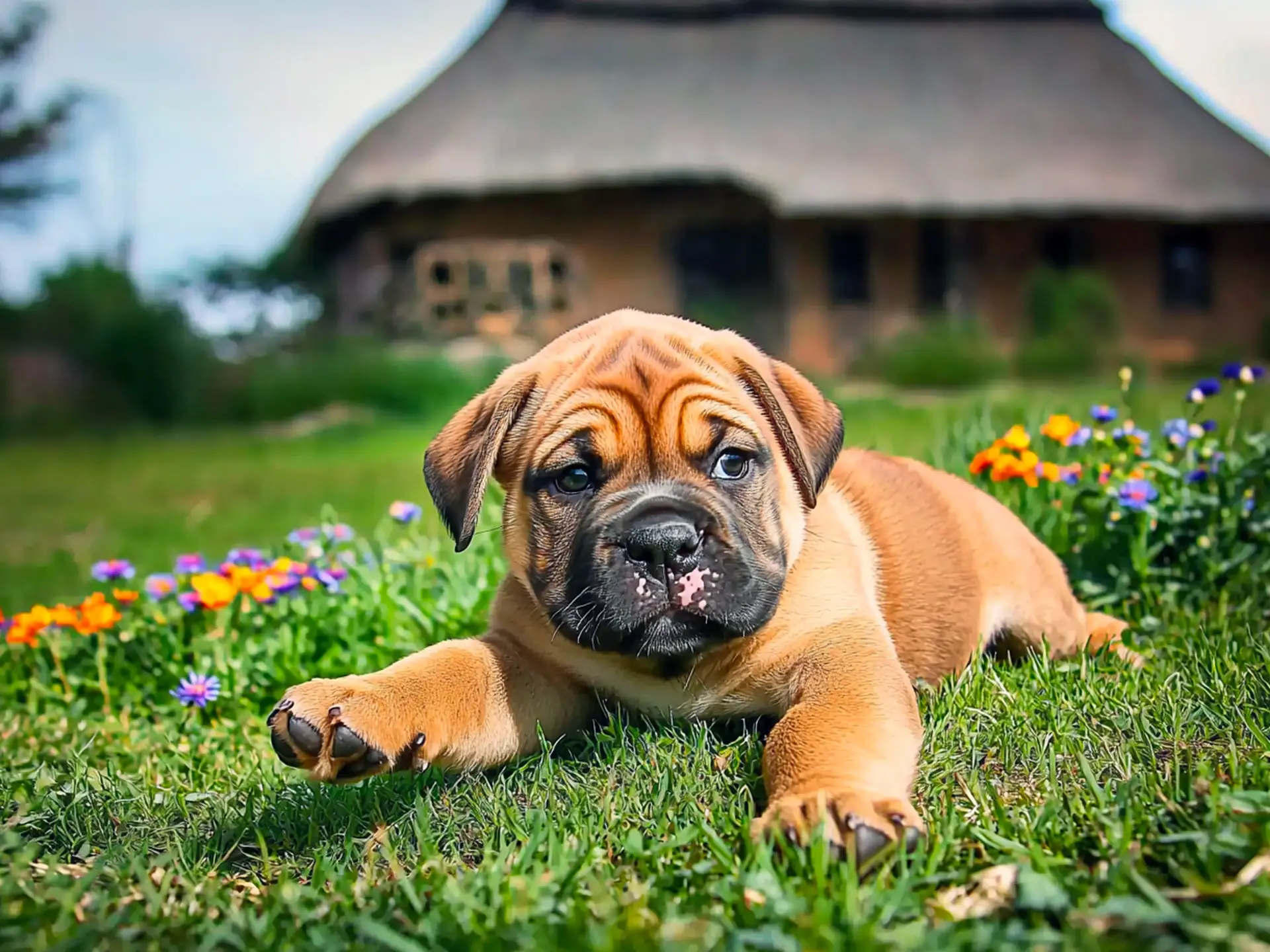Boerboel Dog Breed Info & Overview
The Boerboel is a powerful yet gentle breed hailing from South Africa, renowned for its strength, loyalty, and protective nature. This intelligent dog is both a capable guardian and a loving companion, making it ideal for experienced owners who can handle its size and energy. With proper care, the Boerboel brings a perfect balance of affection and protection.
Characteristics
Pictures
Breed History
The Boerboel traces its roots back to the 17th century when Dutch settlers brought Mastiff-type dogs to South Africa. These dogs were bred with local breeds to withstand harsh conditions and protect farms from predators. Over time, the Boerboel evolved into a robust and resilient guardian, uniquely adapted to the South African landscape.
Their name, “Boerboel,” comes from the Afrikaans words “boer” meaning farmer, and “boel” meaning dog. Essentially, they’re the farmer’s dog—a title they’ve earned through centuries of loyal service. The breed played a crucial role in safeguarding homesteads from wild animals and intruders, showcasing their courage and tenacity.
Despite facing near extinction in the mid-20th century, dedicated enthusiasts revived the Boerboel through selective breeding programs. Today, they are recognized globally for their impressive stature and protective nature, embodying a rich heritage that’s deeply intertwined with South African history.
Temperament, Personality
Boerboels are known for their unwavering loyalty and protective instincts. They form strong bonds with their families and are especially affectionate with those they trust. However, their guarding nature means they can be wary of strangers, making early socialization crucial.
With children, Boerboels can be gentle and patient, but due to their size, supervision is recommended around smaller kids. They’re intelligent and confident, often exhibiting a calm demeanor at home. That said, they need a firm yet loving hand, as they can be assertive if not properly guided.
Their relationship with other pets can vary. If raised together, they can coexist peacefully, but their dominant tendencies might surface around unfamiliar animals. Consistent training and socialization help ensure they grow into well-mannered companions.
Physical Characteristics
Boerboels are imposing dogs with a muscular build and a commanding presence. They have a broad head, strong jaws, and a black mask that adds to their distinctive look. Their eyes are brown and convey intelligence and alertness.
Their coat is short, dense, and smooth, coming in various shades like fawn, red, brown, and brindle. Some may have white markings on the chest and legs. Despite their size, they are agile and capable of quick movements, a trait inherited from their working dog ancestors.
The breed’s overall appearance exudes strength and balance. Males are generally larger and more muscular, while females are slightly smaller but equally powerful. Their tail is usually docked in countries where the practice is still legal, although many breeders now prefer a natural tail.
Health Issues
Boerboels are generally healthy but can be prone to certain genetic health issues. Hip and elbow dysplasia are common concerns due to their size and rapid growth rates. Regular vet check-ups and maintaining a healthy weight can help mitigate these risks.
They may also be susceptible to heart conditions like subaortic stenosis and eye problems such as ectropion or entropion. Screening for these conditions is advisable when selecting a puppy from a breeder. Bloat, a life-threatening stomach condition, can occur and requires immediate medical attention.
Preventive care is essential. Regular health screenings, a balanced diet, and appropriate exercise contribute to a long and healthy life for your Boerboel. Always consult with a veterinarian familiar with the breed for tailored health advice.
Grooming Needs
Boerboels have low to moderate grooming needs thanks to their short coat. Weekly brushing with a rubber curry brush helps remove loose hair and keeps their coat shiny. During shedding seasons, more frequent brushing may be necessary to manage the moderate shedding.
Bathing is only required occasionally, typically every few months unless they get particularly dirty. Overbathing can strip natural oils from their skin, leading to dryness. Regularly check their ears for signs of infection and clean them as needed.
Don’t forget dental hygiene—brushing their teeth several times a week helps prevent dental diseases. Their nails should be trimmed regularly to prevent overgrowth and cracking. Overall, their grooming routine is manageable and can be a great bonding experience.
Exercise Requirements
An active breed, the Boerboel requires 1–2 hours of exercise daily to stay physically and mentally fit. Long walks, jogs, and play sessions in a securely fenced yard are excellent ways to meet their energy needs. They enjoy activities that engage both their mind and body.
Interactive games like fetch or tug-of-war can be both fun and stimulating. Due to their intelligence, they benefit from activities that challenge them mentally, such as obedience training or puzzle toys. This helps prevent boredom, which can lead to destructive behaviors.
Remember, Boerboels are not ideal for apartment living. They thrive in homes with ample space to roam. Regular exercise not only keeps them healthy but also reinforces the bond between you and your canine companion.
Training Tips
Training a Boerboel requires consistency, patience, and a firm yet positive approach. They are intelligent and eager to please but can be strong-willed. Early obedience training and socialization are crucial to ensure they grow into well-behaved adults.
Positive reinforcement methods work best—reward them with treats, praise, or playtime for good behavior. Avoid harsh punishments as they can become stubborn or uncooperative. Establish yourself as a confident leader to earn their respect and trust.
Socializing them with different people, animals, and environments helps reduce wariness of strangers. Enrolling in puppy classes or working with a professional trainer experienced with large breeds can provide additional support and guidance.
Nutrition, Diet
Feeding a Boerboel requires attention to quality and quantity due to their size and growth rate. A diet rich in high-quality protein supports muscle development. Typically, they need 4–5 cups of premium dry dog food daily, divided into two meals to reduce the risk of bloat.
Puppies should be fed a large-breed puppy formula to ensure proper growth without overloading on calories. Monitor their weight and adjust portions as needed, consulting with your veterinarian for personalized advice. Supplements are generally unnecessary with a balanced diet.
Avoid feeding immediately before or after intense exercise to prevent digestive issues. Fresh water should always be available. Be cautious with treats to prevent overfeeding, which can lead to obesity and exacerbate joint problems.
Adoption, Breeders
When considering adding a Boerboel to your family, it’s vital to choose a reputable breeder who conducts health screenings. Organizations like the American Boerboel Club provide resources for finding responsible breeders.
Adoption is another option. Rescue groups specializing in Boerboels can help match you with a dog in need of a loving home. Check out Boerboel Rescue for more information on available dogs.
Avoid purchasing from puppy mills or pet stores where health and temperament may not be a priority. A responsible breeder or rescue will provide health clearances, vaccination records, and be open to answering all your questions about the breed.
Family Pet?
Boerboels can make excellent family pets for households that understand their needs. They are affectionate with family members and can be gentle with children when properly trained and socialized. However, due to their size, supervision around small kids is important.
Their protective nature means they take their role as guardian seriously. This trait can be an asset but requires management to prevent overprotectiveness. Families must commit to ongoing training and socialization to ensure a harmonious household.
They may not be the best choice for families with other dominant pets. Early introductions and training can help, but their assertive nature might pose challenges. Overall, they thrive in families that provide leadership, exercise, and affection.
Right For You?
Deciding if a Boerboel is right for you depends on your lifestyle and experience with large breeds. They require an owner who can provide firm leadership, ample exercise, and a commitment to training. If you have the space and dedication, they can be incredibly rewarding companions.
They are not suited for first-time dog owners due to their size and assertiveness. Homes with a securely fenced yard and no restrictions on large breeds are ideal. If you value loyalty, protection, and have the time to invest, the Boerboel might be your perfect match.
Consider your household dynamics. Families with older children and no small pets are often the best fit. Weighing these factors carefully will help you make an informed decision about welcoming a Boerboel into your life.
Conclusion
The Boerboel is a remarkable breed that offers unwavering loyalty and protection. They thrive with experienced owners who can meet their physical and mental needs. If you’re ready for the commitment, this South African guardian can be a loving and devoted addition to your family.
FAQs
-
Are Boerboels good with other dogs?
Boerboels can be dominant and may not get along with unfamiliar dogs, especially of the same sex. Early socialization and controlled introductions are key to fostering better relationships with other canines.
-
How much space does a Boerboel need?
Given their large size and energy levels, Boerboels require ample space to move around. A house with a securely fenced yard is ideal to accommodate their exercise needs and prevent boredom.
-
Do Boerboels make good guard dogs?
Yes, Boerboels are excellent guard dogs due to their protective instincts and imposing presence. They are naturally alert and will defend their family and property if they perceive a threat.
-
How often should I train my Boerboel?
Consistent training is crucial for a Boerboel. Daily sessions that reinforce obedience and good behavior are recommended. Ongoing training helps manage their assertiveness and strengthens your bond.
-
Are Boerboels suitable for apartment living?
Boerboels are generally not suited for apartment living due to their size and need for space. They thrive in homes where they have room to move and play, reducing the risk of behavioral issues.
Breed Ratings
Boerboels are smart and capable learners but may be stubborn at times.
They enjoy playtime but are more focused on their role as protectors.
With moderate to high energy, they need regular exercise to stay content.
Moderate shedding occurs, especially during seasonal changes.
They have a moderate prey drive; caution is advised around smaller animals.
Low-maintenance grooming thanks to their short coat.
Can be trained well with consistency and positive reinforcement.
Prefer companionship and may become anxious if left alone too long.
Generally quiet but will bark to alert of strangers.
Minimal drooling compared to other mastiff breeds.
May be wary of other dogs; early socialization is important.
Generally healthy but prone to certain genetic conditions.


















